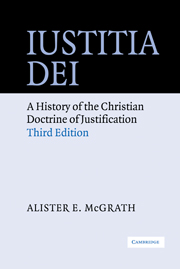Book contents
- Frontmatter
- Contents
- Preface
- List of abbreviations
- 1 Justification: the emergence of a concept
- 2 The Middle Ages: the consolidation of the doctrine
- 3 Protestantism: the Reformation debates on justification
- 4 Catholicism: the Council of Trent on justification
- 5 The modern period
- Glossary of medieval soteriological terms
- Bibliography
- Index
1 - Justification: the emergence of a concept
Published online by Cambridge University Press: 05 June 2012
- Frontmatter
- Contents
- Preface
- List of abbreviations
- 1 Justification: the emergence of a concept
- 2 The Middle Ages: the consolidation of the doctrine
- 3 Protestantism: the Reformation debates on justification
- 4 Catholicism: the Council of Trent on justification
- 5 The modern period
- Glossary of medieval soteriological terms
- Bibliography
- Index
Summary
The Protestant Reformation of the sixteenth century brought about many significant changes within the life and thought of the western churches. This volume concerns one of those – the reconceptualisation and reformulation of the traditional Christian vocabulary of salvation using the Pauline image of justification. Up to this point, the western theological tradition had chosen to develop its thinking about how humanity is reconciled to God in terms of ‘salvation by grace’ (Ephesians 2:8). One of the defining characteristics of the Protestant Reformation is a decisive shift, in both the conceptualities and the vocabulary, of the Christian theological tradition. For a relatively short yet theologically significant period, the reconciliation of humanity would be discussed within the entire western theological tradition primarily in terms of ‘justification by faith’ (Romans 5:1).
As the Reformation and its attendant authority figures slowly receded into the past, the difficulties associated with this way of speaking became increasingly apparent. From the late nineteenth century onwards, growing doubts were expressed as to whether the New Testament, including the Pauline epistles, placed anything even approaching such an emphasis upon the concept of justification. Influential New Testament scholars such as William Wrede and Albert Schweitzer argued that the origins of the concept were polemical, relating to the early tensions between Christianity and Judaism. Wrede insisted that the heart of Paul's thought lay in the concept of redemption.
- Type
- Chapter
- Information
- Iustitia DeiA History of the Christian Doctrine of Justification, pp. 1 - 54Publisher: Cambridge University PressPrint publication year: 2005



